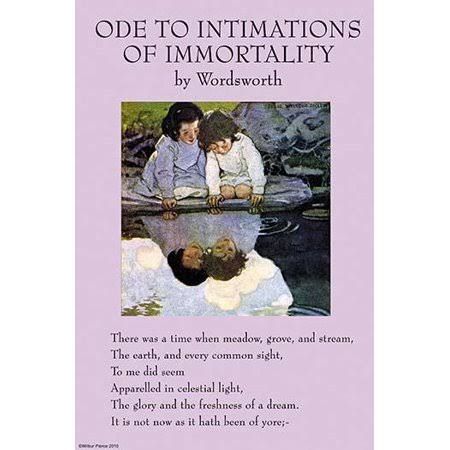Immortality Ode
Jun 13, 2019 • 71 views

"Intimations of Immortality from Recollections of Early Childhood", one of the greatest odes by William Wordsworth, believes that children carry a significant "glory" with themselves when they are born. The Epigraph of the ode begins with:
"Child is the father of man..."
William Wordsworth, believes that child to be on possession of knowledge and mind that is instrumental for mankind. his philosophy specifies that all children in their pre-birth stage experience a certain glory that they carry with them to Earth. This glory gives the child his/her innate innocence and purity.
However the moment the child is born into this corrupt world, the various earthly forces begin influencing him. This happens much later. A newly born child is the epitome of glory on Earth. He carries insight and experience from his pre-birth stage that is crucial for humanity. Childhood is revered as that significant stage which has the power and agency to steer mankind in the desired direction.
Wordsworth even goes on to call children as the "guiding light of humanity", further establishing his statement in the epigraph. Adult men and women have lived for long in this corrupt world and have been affected by the ways of the world substantially. Thus, Wordsworth calls these people "blind deaf and mute", amidst whom, the child is a guiding light.
The child is aware of more things from his pre-birth life. The time he spent in heaven, before being summoned to the earth, shaped his understanding well. When he is born, he is oblivious to the various corruption.
His soul keeps all his philosophies and experiences intact. He has within himself the capability to guide humanity. Wordsworth emphasizes the valuable position of a newborn child in the world.
As long as the child is so away from the influences of the world around him he remains a great asset for mankind. Childhood is a blissful stage, where purity and innocence are the most respected. Wordsworth lays immense emphasizes on these attributes of childhood, as they are nothing but gold in a morally corrupt and hopeless world. He has a lot of expectations from the spirit of childhood and holds on to hope that it will revive the world. The glory carried from pre-birth seems extremely instrumental to practiced in the present world.
Wordsworth is so concerned about keeping the glories of childhood intact that he even suggests that they don't grow at all. as a child matures, all his innocence and glory withers away making him more like the world he was born into, and lesser like the heavenly place that he has come from. He wants to capture the free spirit forever.
The child remains devoid of worldly prejudices and influences and retains his capacity to better and affect the world with his philosophies. His thoughts are pure and substantial in the world. Wordsworth's ode to childhood is an emphasis on the importance of that stage and its capacity.
